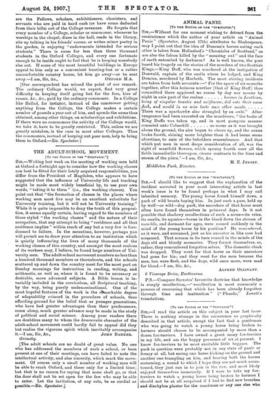THE ADULT-SCHOOL MOVEMENT.
[To THE EDITOR OF THE "SPECTATOR."] SIR,—Writing last week on the meeting of working men held at Oxford a fortnight ago to consider how the working classes can beet be fitted for their lately acquired responsibilities, you differ from the President of Magdalen, who appears to have suggested that the influence of University life and teaching might be made most widely beneficial by, to use your own words, " taking it to them " (i.e., the working classes). You point out that "the formation of classes in the places where working men most live may be an excellent substitute for University training, but it will not be University training." While it is quite impossible to deny the truth of this proposi- tion, it seems equally certain, having regard to the numbers of those styled " the working classes " and the nature of their occupation, that any attempt to bring " residence and all that residence implies " within reach of any but a very few is fore- doomed to failure. In the meantime, however, perhaps you will permit me to draw your attention to an institution which is quietly influencing the lives of many thousands of the working classes of this country, and amongst the most zealous of its workers may, I believe, be found large numbers of Uni- versity men. The adult-school movement numbers no less than a hundred thousand members or thereabouts, and the schools scattered up and down the country meet for the most part on Sunday mornings for instruction in reading, writing, and arithmetic, as well as, where it is found to be necessary or desirable, more advanced subjects. A Bible lesson is in- variably included in the curriculum, all Scriptural teaching, by the way, being purely undenominational. One of the most hopeful features of the work is the remarkable degree of adaptability evinced in the procedure of schools, thus affording ground for the belief that as younger generations, who "have had greater advantages than their predecessors, come along, much greater advance may be made in the study of political and social science. • Among your readers there are doubtless many to whom the democratic character of the adult-school movement could hardly fail to appeal did they but realise the vigorous spirit which inevitably accompanies
[The adult schools are no doubt of great value. No one who has addressed the members of such a school, or been present at one of their meetings, can have failed to note the intellectual activity, and also sincerity, which mark the move- ment. Of course only a small number of working men will be able to reach Oxford, and these only for a limited time; but that is no reason for saying that none shall go, or that the door shall not be set open for the few who may be able to enter. Let the invitation, at any rate, be as cordial as possible.—ED. Spectator.]


































 Previous page
Previous page